McKenzie Wark
McKenzie Wark

Writing on Raving
McKenzie Wark, Zoë Beery and 1 more
Writing on Raving is the definitive mix of voices from the Brooklyn underground rave scene and beyond, providing fresh language for the shared and infinitely varied experience of dancing through the night until the morning.
New York rave culture is having a moment. The music, mostly, is techno, certain flavors of which became the soundtrack to a dancefloor culture that is queer in a different way to house music centered gay nightlife. Wark, Mak and Beery want to document and annotate and celebrate, but also critique, this world in the making. Writing on Raving centers the New York scene, but isn't limited to it.
This is a book for all of those who need the rave. Who need to dance. Who have at some point needed that beat in their lives. This is a book for all those who have journeyed through the night, through sound, through movement, through chemistry, into other places, other times, other encounters.
This seeking gives us hours, years, on the dance floor to think about why we rave, to locate these reasons in our bodies and the space around us. But the rave is not the place to articulate them. It is too loud; our friends are too distracted, or too high. At the afters, tired and drained and covered in schmutz, we think some more. We look around at our raver friends, and wonder: How did we get here? What happened to us? What is this tentacular, thrashing, swelling thing that we all made together? That thing that is now slumped and aching and coming down now into our fragmentary, singular lives
Between all of us, there are many answers to such questions. Wark, Mak and Beery have gathered their favorite ones to share in this first-ever anthology of writing on raving.
McKenzie Wark is a writer and scholar based in New York City. She is the author, among other things, of Raving (2023) and Life Story (2024).
Geoffrey Mak is the author of Mean Boys: A Personal History (Bloomsbury, 2024).
Zoë Beery is a freelance journalist based in Brooklyn, and a nightlife harm reduction organizer at parties and festivals in the U.S. and Europe.

When Monsters Speak: A Susan Stryker Reader
Susan Stryker is a foundational figure in trans studies. When Monsters Speak showcases the development of Stryker’s writing from the 1990s to the present. It combines canonical pieces, such as “My Words to Victor Frankenstein,” with her hard to find earlier work published in zines and newsletters. Brought together, they ground Stryker’s thought in 1990s San Francisco and its innovative queer, trans, and S/M cultures. The volume includes an introduction by editor McKenzie Wark, who highlights Stryker’s connections to developments in queer theory, media studies, and autotheory while foregrounding Stryker’s innovative writing style and scholarly methods. When Monsters Speak is an authoritative and essential collection by one of the most important and influential intellectuals of our time.

Love and Money, Sex and Death: A Memoir
After a successful career, a twenty-year marriage, and two kids, McKenzie Wark has an acute midlife crisis: coming out as a trans woman. Changing both social role and bodily form recasts her relation to the world. Transition changes what, and how, she remembers. She makes fresh sense of her past and of history by writing to key figures in her life about the big themes that haunt us all—love and money, sex and death.
In letters to her childhood self, her mother, sister, and past lovers, she writes a backstory that enables her to live in the present. The letters expand to address trans sisters lost and found, as well as Cybele, ancient goddess of trans women. She engages with the political, the aesthetic, and the numinous dimensions of trans life and how they refract her sense of who she is, who she has been, who she can still become. She confronts difficult memories that connect her mother’s early death to her compulsion to write, her communist convictions, her coming to New York, the bittersweet reality of her late transition, and the joy to be found in Brooklyn’s trans and raver communities.

Raving
McKenzie Wark takes readers into the undisclosed locations of New York's thriving queer rave scene, showing how raving to techno is an art and technique at which queer and trans bodies might be particularly adept, but which is for anyone who lets the beat seduce them.
Contents
1. Rave as Practice
2. Xeno-euphoria
3. Ketamine Femmunism
4. Enlustment
5. Resonant Abstraction
6. Excessive Machine
"How to write a book about raving as a practice that practices rave? From k-nights spent on Brooklyn's and Berlin's junkspace dance floors, McKenzie Wark abstracts a life practice of ressociation in a dance of autoconceptualization and allotheorization. In crossing toward the stranger's gift of 'letting go of ourselves as private property, ' Raving is nothing less than Wark's femmunist manifesto, her tractatus on techno's blackness, her treatise for a twenty-first-century trans ethics."—Kodwo Eshun

Philosophy for Spiders: On the Low Theory of Kathy Acker
McKenzie Wark combines an autobiographical account of her relationship with Kathy Acker with her transgender reading of Acker's writing to outline Acker's philosophy of embodiment and its importance for theorizing the trans experience.
Over the decades readers have found a punk Acker, a feminist Acker, a queer Acker, a kink Acker, and an avant-garde Acker. In Philosophy for Spiders, McKenzie Wark adds a trans Acker.
Wark recounts her memories of Acker (with whom she had a passionate affair) and gives a comprehensive reading of her published and archived works. Wark finds not just an inventive writer of fiction who pressed against the boundaries of gender but a theorist whose comprehensive philosophy of life brings a conceptual intelligence to the everyday life of those usually excluded from philosophy's purview.
As Wark shows, Acker's engagement with topics such as masturbation, sadism, body-building, and penetrative sex are central to her distinct phenomenology of the body that theorizes the body's relation to others, the city, and technology.

Capital Is Dead: Is This Something Worse?
It's not capitalism, it's not neoliberalism - what if it's something worse?
In this radical and visionary new book, McKenzie Wark argues that information has empowered a new kind of ruling class. Through the ownership and control of information, this emergent class dominates not only labour but capital as traditionally understood as well. And it's not just tech companies like Amazon and Google. Even Walmart and Nike can now dominate the entire production chain through the ownership of not much more than brands, patents, copyrights, and logistical systems.
While techno-utopian apologists still celebrate these innovations as an improvement on capitalism, for workers, and the planet, it's worse. The new ruling class uses the powers of information to route around any obstacle labor and social movements put up. So how do we find a way out? Capital Is Dead offers not only the theoretical tools to analyze this new world, but ways to change it. Drawing on the writings of a surprising range of classic and contemporary theorists, Wark offers an illuminating overview of the contemporary condition and the emerging class forces that control, and contest it.
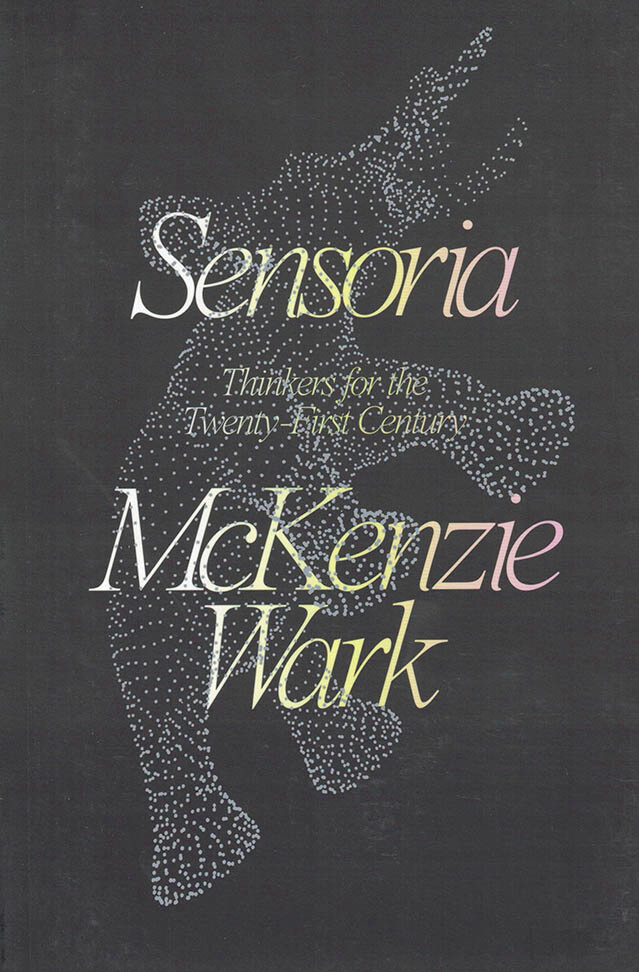
Sensoria
As we face the compounded crises of late capitalism, environmental catastrophe and technological transformation, who are the thinkers and the ideas who will allow us to understand the world we live in? McKenzie Wark surveys three areas at the cutting edge of current critical thinking: design, environment, technology and introduces us to the thinking of nineteen major writers. Each chapter is a concise account of an individual thinker, providing useful context and connections to the work of the others.
The authors include: Sianne Ngai, Kodwo Eshun, Lisa Nakamura, Hito Steyerl, Yves Citton, Randy Martin, Jackie Wang, Anna Lowenhaupt Tsing, Achille Mbembe, Deborah Danowich and Eduardo Viveiros de Castro, Eyal Weizman, Cory Doctorow, Benjamin Bratton, Tiziana Terranova, Keller Easterling, Jussi Parikka.
Wark argues that we are too often told that expertise is obtained by specialisation. Sensoria connects the themes and arguments across intellectual silos. They explore the edges of disciplines to show how we might know the world: through the study of culture, the different notions of how we create such things, and the impact that the machines that we devise have had upon us. The book is a vital and timely introduction to the future both as a warning but also as a road map on how we might find our way out of the current crisis.
McKenzie Wark is the author of Capital is Dead, General Intellects and Molecular Red among other books. She teaches at the New School for Social Research and Eugene Lang College in New York City.
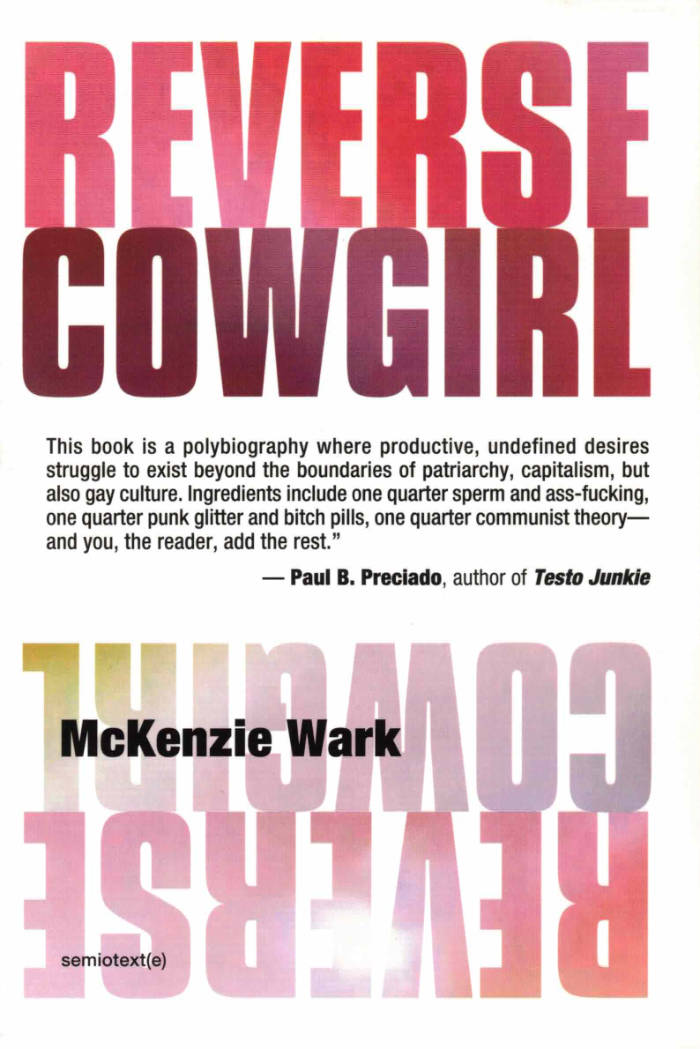
Reverse Cowgirl
McKenzie Wark invents a new genre for another gender: not a memoir but an auto-ethnography of the opacity of the self.
Another genre for another gender.
What if you were trans and didn't know it? What if there were some hole in your life and you didn't even know it was there? What if you went through life not knowing why you only felt at home in your body at peak moments of drugs and sex? What if you expended your days avoiding an absence, a hole in being? Reverse Cowgirl is not exactly a memoir. The author doesn't, in the end, have any answers as to who she really is or was, although maybe she figures out what she could become.
Traveling from Sydney in the 1980s to New York today, Reverse Cowgirl is a comedy of errors, chronicling the author's failed attempts at being gay and at being straight across the shifting political and media landscapes of the late twentieth century. Finding that the established narratives of being transgender don't seem to apply to her, Wark borrows from the genres of autofiction, fictocriticism, and new narrative to create a writing practice that can discover the form of a life outside existing accounts of trans experience: an auto-ethnography of the opacity of the self.
And more

Across the Acheron
In her darkly funny 1985 take on Dante’s Divine Comedy, acclaimed French writer and activist Monique Wittig restages the journey through the circles of hell, limbo, paradise from a lesbian feminist perspective.
Never-before published in the US, Across the Acheron follows the adventures of “Wittig” and her anti-Virgilian guide through laundromats, billiard parlors, dyke bars, and picnic grounds of a 1980s San Francisco populated by hunters and their prey, lost souls, and fantastical beasts, including a robotic eagle and angelic bikers. Wittig reimagines Dante’s epic poem through a feminist and queer lens, subverting his cosmological order and upending gender identities and literary traditions. This edition brings the English translation of Wittig’s final novel back into print for the first time since the early-1990s, revised according to the author's notes, and with a new introduction by Sophie Lewis.
“Across the Acheron is a work of lesbian struggle and triumph across two kinds of hell. The hell of the classic western literary canon—and the hell of San Francisco. Monique Wittig brings all of her writerly powers and political experience to bear here, as witness to the horrors of heterosexual patriarchy and also to the possibility of another world for another life. Her work is a rare combination of deeply felt materialism and radical linguistic freedom. If we're to have another world, we'll need to create another language. She knew that, and she lived it.” — McKenzie Wark
“Even in fiction Monique Wittig’s writing is critical, prescient, brilliant, satirical, searing, and way ahead of its time. I’m so glad this work is back in circulation to revisit and revel in.” — Pamela Sneed
“In this unendurable yet compelling journey through the circles of patriarchal hell, Wittig encounters hordes of tortured women who do not struggle against their oppressors. Their brainwashing is as difficult to witness as their bloodied flesh. Only through communal activism does the seeker’s soul becomes tough enough to enter Paradise, where bare-breasted angels dismount motorcycles and offer baskets of 'cherries, strawberries, raspberries, apricots, peaches, plums, tomatoes, avocados, green melons, cantaloupes, watermelons, lemons, pawpaws, pineapples and coconuts.’ The bounties of Across the Acheron are lush and many.” — Dodie Bellamy
“A Guernica of the human (feminist) condition, a blacker, bleaker, more vengeful Alice’s tea party, this is a novel as graphic as a painting, whose brilliance its translators have creditably preserved.” — Publishers Weekly
Introduction by Sophie Lewis
Translated by David Le Vay with Margaret Crosland
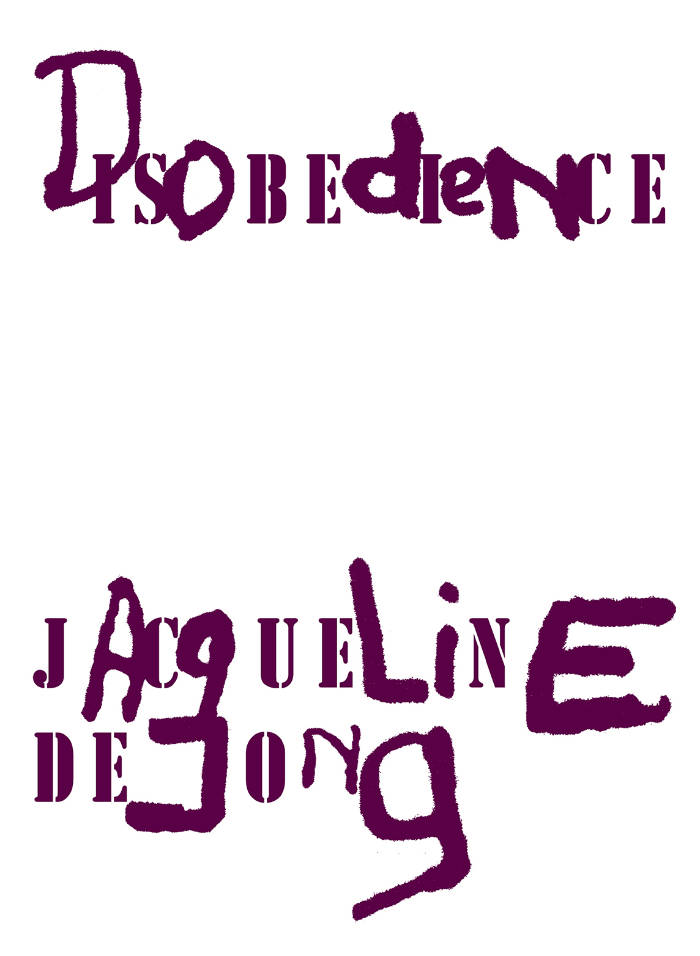
Disobedience
Published to accompany the artist's retrospective at the Kunstmuseum St. Gallen (September 2025–March 2026), this comprehensive monograph offers a detailed overview of the work of Dutch artist Jacqueline de Jong. Designed by Sabo Day and edited by Melanie Bühler, curator of the exhibition, this publication spans De Jong's entire artistic journey of from her editorial activities and bold figurative paintings of the 1960s to her "Billiards" series in the 1970s, and her latest series of the 2020s that reflect the current state of the world.
It features new essays by Karen Kurczynski (Professor of History of Art and Architecture at the University of Massachusetts Amherst), Emily LaBarge (writer and critic), Tiana Reid (Assistant Professor of English at York University), Paul Bernard (Director of Kunsthaus Biel), as well as an as-yet-unpublished conversation with the artist and McKenzie Wark (writer and theoretician).
Organized through six sections entitled "Disobedience," "Publishing," "Chaos," "Pop," "Play," and "Politics," all lavishly illustrated, it underlines the challenging approach to art and life developed by De Jong formally, visually, and conceptually from the early 1960s until 2024.
Edited by Melanie Bühler
Texts by Emily LaBarge, Gianni Jetzer, Jacqueline de Jong, Karen Kurczynski, McKenzie Wark, Melanie Bühler, Paul Bernard, Tiana Reid.
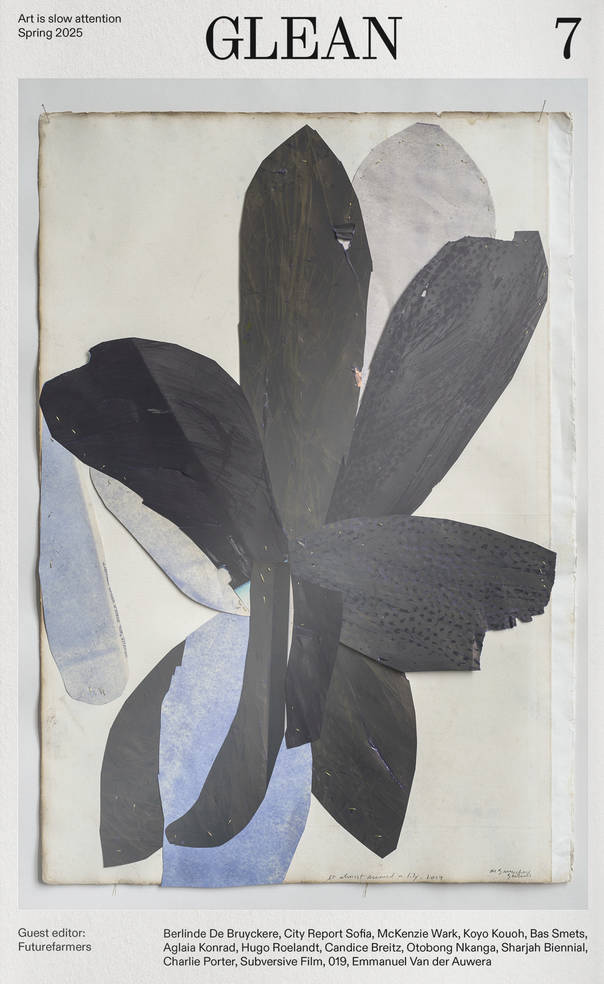
GLEAN 7 - Spring 2025
Futurefarmers, Berlinde De Bruyckere, City Report Sofia, McKenzie Wark, Koyo Kouoh, Bas Smets, Aglaia Konrad, Hugo Roelandt, Candice Breitz, Otobong Nkanga, Sharjah Biennial, Charlie Porter, Subversive Film, 019, Emmanuel Van der Auwera.
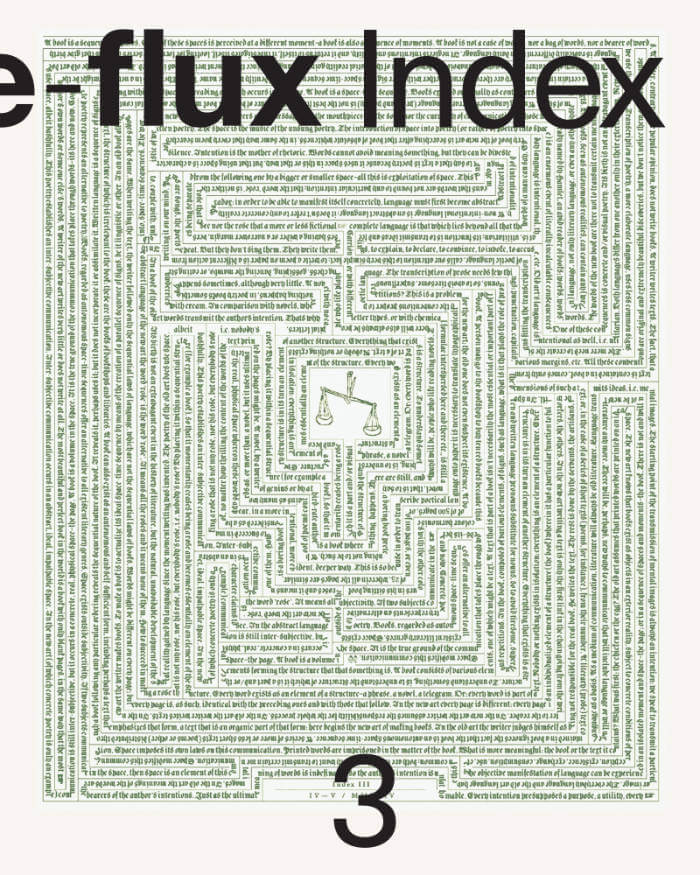
e-flux Index #03
76 contributions from an international selection of critics, artists, poets, architects, filmmakers, and theorists, published by e-flux between April–May 2024, arranged into 11 thematic chapters—ranging from the live question of cultural censorship through to the role of diagrams and notation in contemporary artistic practice.
540 pages long, this volume includes contributions from authors, artists, architects, filmmakers, poets, and theorists from many parts of the world. Ulises Carrión once declared that "In the new art every book requires a different reading"—an attitude which the Index here adopts in its approach to contemporary culture.
Contributions by Kwabena Appeaning Addo, Kimberly Alidio, Shouka Alizadeh, Corina L. Apostol, Aram, Arnavaz, Andrius Arutiunian, Robert Ashley, Goli Baharan, Stephanie Bailey, Oliver Basciano, Merve Bedir, Silvia Benedito, Pietro Bianchi, Alessandro Bosetti, Arno Brandlhuber, Nathan Brown, Boris Buden, Harry Burke, Rocio Calzado, Matevž Čelik, Adeline Chia, Ted Chiang, Canada Choate, Jace Clayton, Kim Cordóva, Ana Dana Beroš, Dasgoharan, Miri Davidson, Nuzhan Didartalab, Travis Diehl, Brian Dillon, Maria Dimitrova, Ben Eastham, Ren Ebel, Elaheh, Ludwig Engel, Future Foodscapes Research Unit, Ghoncheh Ghavami, Olaf Grawert, Boris Groys, Maddie Hampton, Negar Hatami, Jörg Heiser, Sandi Hilal, Daisy Hildyard, Juan José Santos, Nicole Kalms, Biljana Kašić, Tamta Khalvashi, Alina Kolar, Mo Michelsen Stochholm Krag, Cat Kron, Agnieszka Kurant, Michał Libera, R.H. Lossin, Rômulo Moraes, Daniel Muzyczuk, Nahal Nikan, Tausif Noor, Bahar Noorizadeh, Alice Notley, Joe Osae-Addo, Parva, Octave Perrault, Alessandro Petti, Andreas Petrossiants, Filipa Ramos, Jacques Rancière, Robida, Aoife Rosenmeyer, Mika Savela, Debora Silverman, Daniel Spaulding, Jonas Staal, Kerstin Stakemeier, Ben Vida, Anthony Vidler, McKenzie Wark, Katrina Wiberg, Kaelen Wilson-Goldie, Jenny Wu, Osman Can Yerebakan, Vivian Ziherl.
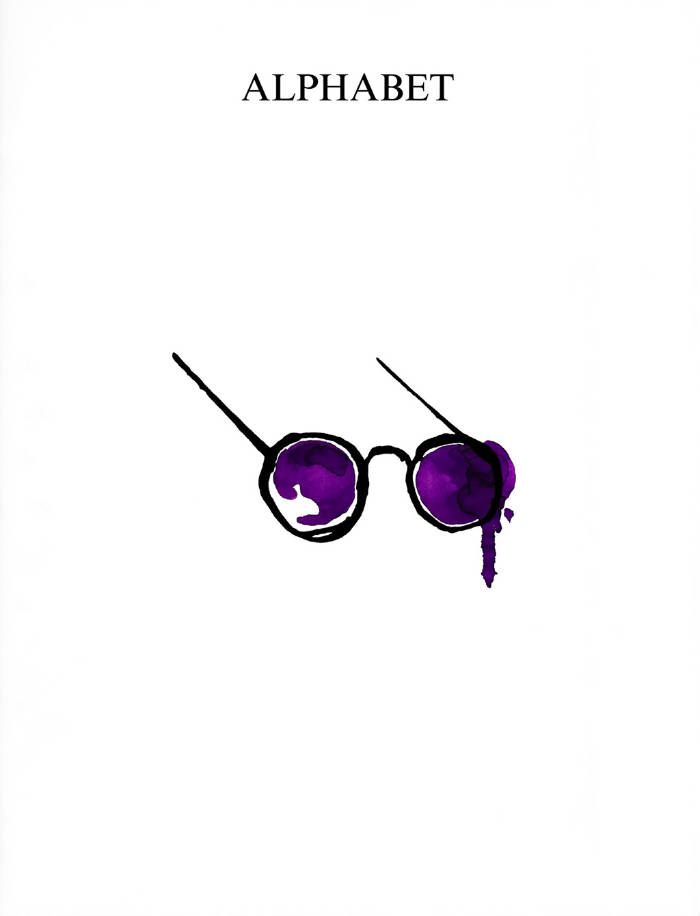
Alphabet Magazine #01
The first issue of the magazine made by artists, founded by Donatien Grau and Thomas Lenthal. Contributions by Mathias Augustyniak, Naomi Campbell, Théo Casciani, Michael Chow, Pan Daijing, Es Devlin, Claire Fontaine, Edwin Frank, Theaster Gates, Nicolas Godin, Alejandro Jodorowsky, Hedi El Kholti, Michèle Lamy, Paul McCarthy, Ian McEwan, Eileen Myles, Marc Newson, Hans Ulrich Obrist, Diana Widmaier Picasso, Ariana Reines, Barbara Chase-Riboud, Julian Schnabel & Jason Momoa, Hanna Schygulla, Juergen Teller, Iké Udé, McKenzie Wark, Robert Wilson, Yohji Yamamoto.
Alphabet is the artists' magazine. Here, they run the show. They write, they make images, they select their own works, they interview the figures they admire, they tell us what we did not know about them nor could have ever fathomed about life. This magazine is conceived entirely to put them in the driver's seat, and to enable readers to become part of the unique vision of some of today's greatest luminaries.
It is a manifestation of the creative community, coming together from all fields, from all generations and threads of culture. Writers, musicians, designers, painters, sculptors, poets—artistic figures of every kind converse all the time in their lives, but they did not have a shared space for their editorial projects. This is it.
Everyone who finds their way into Alphabet has made a mark on life, art, and culture, in a way that signals their importance to the present. Some of the contributors may be world famous, others well respected, others on the way to becoming the legends they already are. Their relevance to culture is the same, and that is why they all belong here, in the endeavor of the creative community. There is no hierarchy of status, or domain, or apparent impact. Some of the greatest revolutions happen undercover. Some of the most established voices are still breaking ground. The magazine's premise is simple: the old opposition between pop and underground does not make sense anymore. There are many creative communities, each following its own rules, each inventing its own space. Here, wherever they come from, whatever their community, artists can exist together, with the same intention of changing, and improving, what life is; with the same belief that art matters more than anything else.
None of the contributors is here randomly. They keep life thrilling and exhilarating, challenge the perception of everything and anything. Their role in shaping every aspect of life can hardly be overstated. That is why they needed a place to elaborate their own alphabet, their way of ordering and structuring language, the world, and the fabric of life—a place of freedom, where everything would be done to highlight their visions, where the very design would be a shrine to their magic. Even the distribution of the magazine was conceived with artists—each contributor suggesting sites of their liking.
Alphabet is also the magazine of magazines. Here, readers find essays, fictions, poetry, visual projects, DIY methods, recommendations from those who know, even games and astrology—and an artist's alphabet, articulating an entire universe. Anything that has ever formed a section of a magazine could find its way here. Even the cover is conceived by an artist: it was conceived especially by the legendary Robert Wilson. Artists will rejuvenate what magazines are, and magazines will be kept forever young by and with them.
Founded by Donatien Grau and Thomas Lenthal, Alphabet is a bi-yearly art magazine. Not a magazine about art. It's a magazine made by artists. Each contribution like an œuvre, making it the ultimate collector piece. Each cover is designed, with the word Alphabet, by a different artist, initiating a cult series.
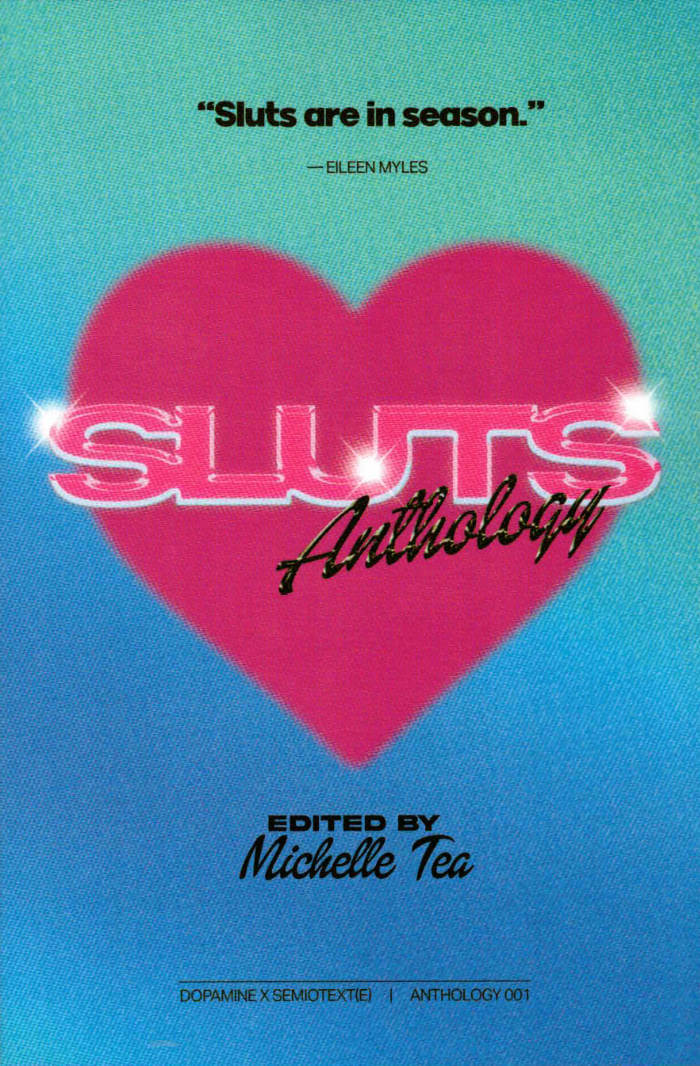
Sluts: Anthology
What it means to be sexually promiscuous in contemporary American culture, edited by cult-favorite author Michelle Tea.
SLUTS, the first publication from vulgarian queer publisher DOPAMINE BOOKS, is an exploration of what it means to be sexually promiscuous in contemporary American culture. Featuring personal essays, spilled secrets, fiction, memoir, and experimental works, SLUTS asks writers and readers to investigate the many ways the notion of the slut impacts our inner and outer lives, as a threat or an identity, a punishment or an aspiration, a lifestyle, an aesthetic, a philosophy and rallying cry. From hideous and terrifying first encounters to postapocalyptic polyamory, from unionizing sex workers to backstage tableaux of sex and drugs and rock and roll, SLUTS's stories probe the liberating highs and abject lows of physical abandon. Featuring work from performer Miguel Gutierrez, hailed by the New York Times as “an artist of ordered excess”; former Nylon magazine editor in chief Gabrielle Korn; award-winning author Brontez Purnell; Whore of New York author Liara Roux; National Book Critics Circle Award winner Jeremy Atherton Lin; and a host of additional artists and writers, SLUTS reveals the knowledges provoked by a dalliance with desire.
Contributors
DL Alvarez, Vera Blossom, Chloe Caldwell, Cristy Road Carrera, Sam Cohen, Tom Cole, Lydia Conklin, jimmy cooper, Lyn Corelle, Jenny Fran Davis, Cyrus Dunham, Hedi El Kholti, Robert Glück, Miguel Gutierrez, Gary Indiana, Taleen Kali, Cheryl Klein, Gabrielle Korn, Jeremy Atherton Lin, Nate Lippens, Meredith Maran, Carta Monir, Amanda Montell, Carely Moore, Bradford Nordeen, Baruch Porras-Hernandez, Kamala Puligandla, Brontez Purnell, Liara Roux, Andrea Sands, Daviel Shy, Jen Silverman, Anna Joy Springer, Laurie Stone, McKenzie Wark, Zoe Whittall.

Fortune Teller
Sticky Fingers' Fortune Teller features wisdom from McKenzie Wark, Octavia E. Butler, Kate Zambreno, bell hooks, Clarice Lispector, Eileen Myles, Kathy Acker, Johanna Hedva, Lou Sullivan, Audre Lorde, June Jordan, and Anne Boyer.
A3, single colour risograph

You spin me around: essays on music
Nathan O’Donnell, Niamh Dunphy and 1 more
You spin me round is an illuminating collection of essays, an essential mixtape that takes elements of music – songs, performances, albums, gigs – as points of departure. Some of the finest writers at work today reflect on what music has meant to them at different moments in their lives.
The writers sift through the material artefacts of their music worlds – torn ticket stubs, creased flyers, worsted wristbands – those items that slip out of a book or the back of a drawer, or that appear crumpled in the pocket of an old coat. You spin me round is a compilation of totems, a distillation of ineffable musical experiences.
With contributions by Ciaran Carson, Brian Dillon, Wendy Erskine, Aingeala Flannery, Peter Geoghegan, Colin Graham, M. John Harrison, Tabitha Lasley, Declan Long, Jayne A. Quan, McKenzie Wark, and Sydney Weinberg.

Verlag der Buchhandlung Walther König
Get Rid Of Meaning
American author Kathy Acker was one of the most influential writers of the 20th century. Working through an experimental and avant-garde tradition, she wrote numerous novels, essays, poems, and novellas from the early 1970s to the late 1990s. As a postmodernist, plagiarist, and post-punk feminist, she continues to inspire generations of writers, philosophers, and artists. Get Rid of Meaning is the first comprehensive publication on Acker’s work from an artistic and literary perspective. It includes previously unpublished material from Acker’s personal archive and other collections. The publication is the compilation of a multipart research project including an exhibition and a symposium at Badischer Kunstverein in Karlsruhe.
With contributions from: Kathy Acker, Eleanor Antin, Dodie Bellamy, Hanjo Berressem, Ruth Buchanan, William S. Burroughs, Anja Casser, Georgina Colby, Leslie Dick, Claire Finch, Johnny Golding, Lynn Hershman Leeson, Anja Kirschner, Chris Kraus, Sylvère Lotringer, Douglas A. Martin, Jason McBride, Karolin Meunier & Kerstin Stakemeier, Avital Ronell, Carolee Schneemann, Daniel Schulz, Matias Viegener & McKenzie Wark.

Spike #73 – Vulnerability
To live means to be exposed, to be vulnerable, and seek safety. But what if we give up control and don't try to cover the wounds any more? Could we ultimately transcend to openness? This is one of the core questions Spike asks in its autumn issue. From the imperfections of the body to automated text generators, from poor images to pop stars. Spike #73 is about art's soft underbelly, why writing in first person is a risk, why humans fear each other, and grappling with grief, paranoia, and intoxication. Let's find out what happens if we take off our shells.
With contributions by: McKenzie Wark, Marlene Dumas, Tosh Basco, James Richards, Raimundas Malašauskas, Joanna Walsh, Kandis Williams, Mire Lee, Gustav Metzger, Rob Horning, Tea Hacic-Vlahovic, Constance Debré, Luca Lo Pinto, Simone Forti...
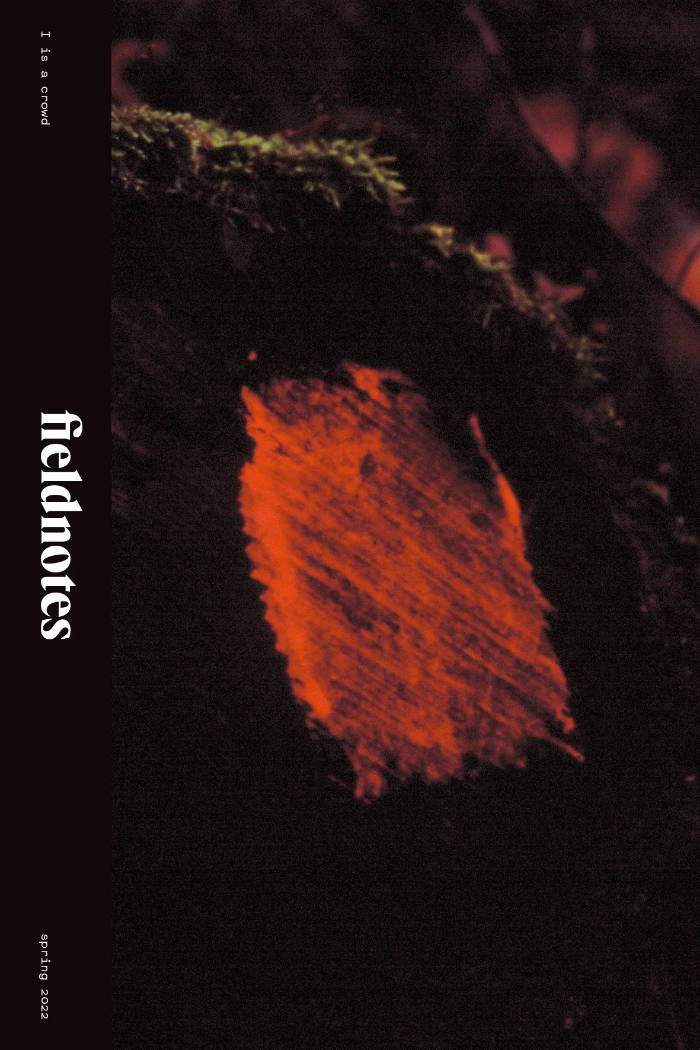
Fieldnotes Issue 3
Fieldnotes is a biannual print journal publishing new writing and artworks with a focus on practices that work between disciplines and against type. There is always a third thing between two things that are known; we are interested in whatever there is between translations/transitions, things-in-progress, converging genres, methods of excavation and formal innovation. The purpose of the journal is to provide a test site for ideas and research; a space for experimental modes and new prototypes.
The third issue of FIELDNOTES contains new work by:
CAConrad & George Finlay Ramsay
Charlie Hawksfield
Yvonne
Angus McCrum
Peter Gizzi
McKenzie Wark
Kate Paul
Michelle Williams Gamaker
Georges Bataille & Rachelle Rahmé
Declan Wiffen
Rosa Barba
Travis Jeppesen
Robert Glück & Arnold Kemp
Cecilia Pavón & Jacob Steinberg
George Lynch
Yuhan Shen

Museum of Capitalism
The Museum of Capitalism, a traveling exhibition that has been hosted in Oakland and Boston and will arrive in New York City in fall 2019, treats capitalism as a historical phenomenon. This speculative institution views the present and recent past from the implied perspective of a future society in which our economic and political system has ended, and is now memorialized and subjected to the museological gaze. The goal of the museum, and its publication, is to "educate this generation and future generations about the ideology, history and legacy of capitalism." To this end, Museum of Capitalism features sketches and renderings of exhibits and artifacts, combined with relevant quotations from historical sources, interspersed with speculative essays on the intersections of ecology, race, museology, historiography, economics and politics.
Included are representations of artworks and museum exhibits created by artists Oliver Ressler, Sayler/Morris, Dread Scott, Temporary Services, Superflex and others, original Isotype graphics drawn from the museum's lexicon of "capitalisms" and texts from Lucy Lippard, Lester K. Spence, T.J. Demos, Chantal Mouffe, McKenzie Wark and Kim Stanley Robinson, among others. For this new, expanded second edition of Museum of Capitalism (the first was published in 2017), Jodi Dean, Ben Davis, Madeline Lane-McKinley, Nina Power, Abigail Satinsky, Simon Sheikh and FICTILIS have contributed new texts.